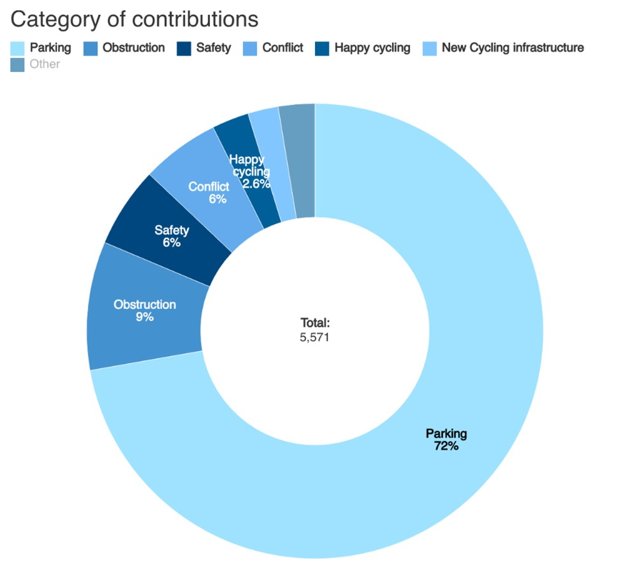Sustainable Cities
Can a mobile app help to make cities more biker friendly?
7 min
Researchers have developed a citizen science platform that enables users to influence the bike-friendliness of their city.
Traffic and pollution are becoming bigger problems in cities. One way to tackle these issues – while also helping to fight climate change on a bigger scale – is by using bicycles instead of larger vehicles that produce more CO2.
These days, more and more people are choosing to cycle to get from A to B. That's a positive development in itself, but in many cities, cycling remains difficult.
No wonder that improving the bikeability of cities has become an important aim for urban planners.
To support this goal, researchers worked together to develop BiciZen: a collaborative citizen science platform that aims to empower urban cyclists with relevant travel information, help cities promote low-carbon mobility, and provide the research community with useful data.
Now, what exactly is bikeability? The tricky thing is that there are different answers to this question.
Bikeability is not just about rateable physical aspects like bike lanes and road conditions. It also depends on how safe or comfortable people feel when cycling in certain places.
These “objective” and “subjective” perspectives don’t always align because there are always personal factors at play, such as age, gender, the reason for cycling, or past experiences. Even people going the same way might prefer different routes.
So, planning for bikeability requires understanding both perspectives.
The researchers didn’t choose the citizen science route by accident.
Citizen science brings together everyday people and researchers to tackle big questions that scientists can't solve on their own. Supported by new technology, it's being used in all kinds of areas, with involved citizens helping to collect data and providing valuable suggestions for improvement.
Since bikeability depends on people's daily experiences, citizen science is a great fit for this kind of approach. Formerly scattered knowledge, observations and insights can be channelled into useful information to improve cycling routes and city planning.
The input includes voices that often remain unheard, such as those of young or elderly people for whom cycling may offer independent mobility.
The citizen science approach has been used before to gain insight into cyclists’ everyday knowledge and experiences. There are projects collecting data on incidents, near misses, and hazards to improve safety.
Other initiatives aim to enhance bike-friendliness by crowdsourcing route ratings, mapping safe paths and bike parking, and collecting feedback on cycling conditions.
Together, these projects show how citizen input can support safer and more enjoyable urban cycling.
The creation of the BiciZen platform was a multi-university collaboration involving Universitat Autònoma de Barcelona, University of Aveiro, Dublin City University, Tampere University, and University of Twente.
The project was launched in early 2022 with a team consisting of people from various fields like urban planning, engineering, economics, and computer science. Based on stakeholder input, the project’s original focus on incident reporting was later expanded to include more interactive and community-oriented features.
BiciZen was set up as a mobile phone app that allows users to share information about their cycling experiences with other users and stakeholders. Cyclists can report on aspects like positive cycling experiences, the location and occupancy of bicycle parking spots, safety, bike theft, conflicts with other road users, and obstructions on cycle paths.
They can also make suggestions for improvements to, for example, cycling infrastructure or the BiciZen app itself.
Besides everyday users, BiciZen can be used by city planners and researchers interested in cycling phenomena and trends.
In its first ten months of operation (February to December 2023), BiciZen collected 5,571 contributions from 203 users across 23 countries. The vast majority of contributions concerned bicycle parking, followed at a distance by obstruction, conflict, and safety.
Interestingly, more than two-thirds of all contributions were generated by a small number of “super-users”.
BiciZen also turned out to be adaptable: in the summer of 2023, the team collaborated with a local cycling group in Barcelona to use the platform to document infrastructure maintenance needs.

The contributions to BiciZen in 2023 by category. Honey-Rosés et al. (2025)
Looking back, the authors note that the process of co-designing the platform with stakeholders cost more time and resources than expected, particularly when it came to processing user feedback.
Other challenges were in finding the right balance between the app’s accessibility and functionality, and in dealing with the different requirements and preferences of different user types (citizens, policy makers, and researchers).
The heavy influence of super-users reflected the importance of finding ways to actively engage more users and to keep them engaged.
Finally, BiciZen unexpectedly became a data repository for earlier cycling incidents and observations. This underlines the platform’s potential for community documentation.
The authors conclude that the BiciZen platform certainly shows promise where cyclist empowerment is concerned.
However, turning all input into meaningful scientific insights or policy changes will take a lot of additional work and collaboration, especially with city officials and cycling groups.
Questions remain about how crowdsourced tools such as BiciZen can actually keep users involved and ultimately influence decisions.
That being said, in years to come, the platform could continue to prove its usefulness, especially for purposes like tracking bike parking problems and theft, and investigating how cycling habits vary by gender and age.
Visit the Bicizen website to learn more.
This story is an adaptation of a published journal article: Honey-Rosés, J., Liebscht, L., Batista, P., Benatallah, B., Brussel, M., Flacke, J., ... & Vilariño, F. (2025). BiciZen: Lessons in the development of a crowdsourcing mobile app to make cities more bikeable. Journal of Participatory Research Methods, 6(1), 143-168.
It has been adapted with permission from the authors and under the copyright license CC BY 4.0
Follow the link below to read the original paper: